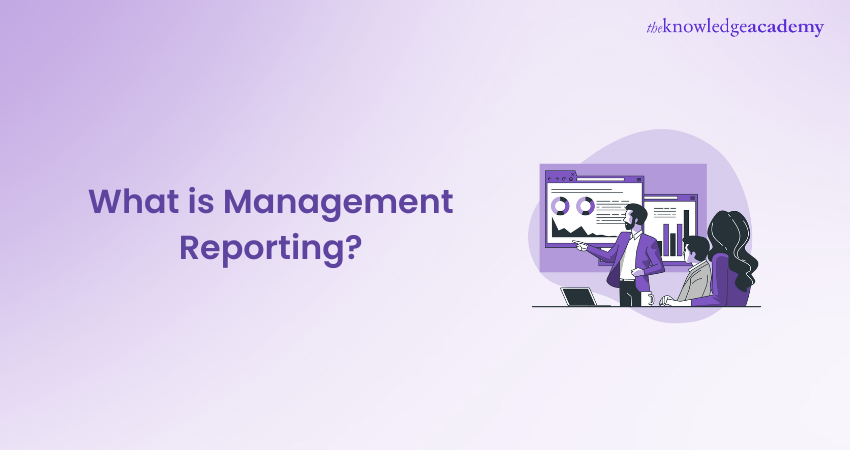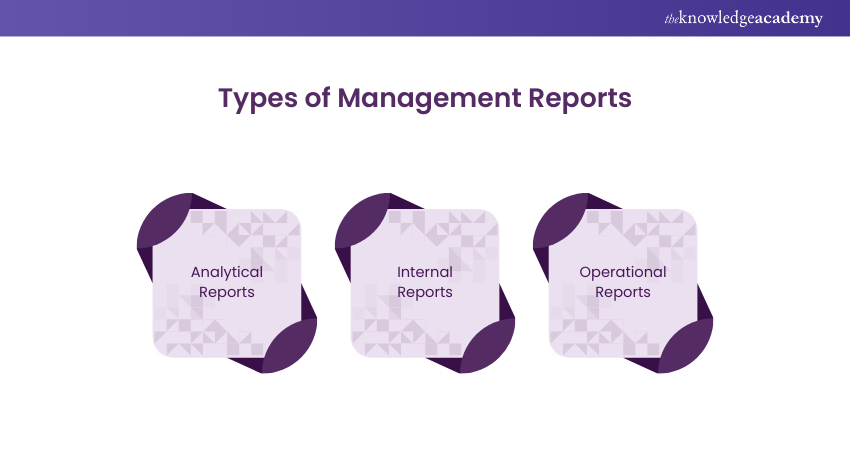We may not have the course you’re looking for. If you enquire or give us a call on +352 8002-6867 and speak to our training experts, we may still be able to help with your training requirements.
Training Outcomes Within Your Budget!
We ensure quality, budget-alignment, and timely delivery by our expert instructors.

Struggling to track your business’s performance and make data-driven decisions? Understanding What is Management Reporting can transform your approach. It’s key to improving decision-making and boosting business performance by effectively collecting, analysing, and presenting crucial information.
Effective Management Reporting clarifies performance metrics, operational efficiency, and financial health, leading to improved strategic planning and problem-solving. Explore this blog to learn What is Management Reporting and how it can streamline decision-making and boost your organisation's success.
Table of Contents
1) What is Management Reporting?
2) Why are Management Reports Important?
3) Key Elements of an Effective Management Report
4) Types of Management Reports
5) Advantages of Management Reports
6) Disadvantages of Management Reports
7) Best Practices for Effective Management Reporting
8) Conclusion
What is Management Reporting?
Management Reports keep internal stakeholders informed about company activities. These reports are used by managers and executives to make decisions, track progress, and manage operations.
Employees submit reports to managers, who then share this information with executive Leadership for strategic planning. Management Reports vary in content but often include financial and operational data on specific business segments.
As confidential documents, they are for internal use only and do not follow external standards like Generally Accepted Accounting Practice (GAAP) or International Financial Reporting Standards (IFRS). Unlike regulatory reports, they have no external deadlines and are created based on internal needs.
Why are Management Reports Important?
Understanding the importance of Management Reporting is crucial for grasping factors affecting your business operations. Management Reporting provides leaders with insights into Key Performance Indicators (KPIs) and helps set performance goals. These reports enable decision-makers to draw conclusions from accurate data, leading to more informed business decisions.
By driving essential changes, Management Reporting aids in crafting strategies to enhance performance, efficiency, profitability, and growth.
Key Elements of an Effective Management Report
Here are the key elements of an effective Management Report:
a) Clear Objectives: Define the purpose and goals of the report to guide its focus and content.
b) Relevant Data: Include data that is pertinent to the report's objectives, such as financial metrics, KPIs, and operational statistics.
c) Concise Summaries: Present information in a clear and concise manner to make it easy for stakeholders to understand key points.
d) Visual Aids: Use charts, graphs, and tables to illustrate data trends and patterns effectively.
e) Actionable Insights: Highlight key findings and recommendations to drive decision-making and strategic planning.
f) Regular Updates: Provide timely updates to ensure the information remains relevant and useful for ongoing assessments.
g) Accuracy and Consistency: Ensure all data is accurate and consistently presented to maintain credibility and reliability.
Types of Management Reports
Management Reports come in various types, each serving a distinct purpose to aid decision-making and strategic planning. Here are the main types:

1) Analytical Reports
Analytical reports focus on evaluating complex data to uncover trends, patterns, and insights. They often include detailed analyses and interpretations to support strategic decisions. These reports help managers understand underlying factors affecting performance, forecast future trends, and make informed decisions based on data-driven insights.
2) Internal Reports
Internal reports are designed for internal stakeholders within an organisation. They typically cover financial performance, operational efficiency, and other metrics relevant to day-to-day management.
These reports help managers track progress, assess departmental performance, and ensure alignment with organisational goals. They are usually confidential and used for internal purposes only.
3) Operational Reports
Operational reports provide insights into the day-to-day operations of a business. They include metrics related to production, sales, inventory, and other operational activities. These reports help managers monitor and manage routine activities, identify operational issues, and make decisions to optimise performance and efficiency.
They are often generated on a regular basis to provide ongoing visibility into operational aspects.
Advantages of Management Reports
A Management Report is a crucial tool that helps managers and business leaders evaluate various aspects of business performance. Management Reporting offers numerous benefits to Business Advisors, Management Staff, and CFOs, including:
a) Strategic Decision-making: Provides essential data and insights for informed decision-making.
b) Business Health: Helps leaders assess overall business health to avoid unnecessary losses or expenses.
c) Performance Goals: Assists in identifying KPIs and setting goals.
d) Communication: Facilitates information sharing and alignment towards common performance goals.
e) Collaboration: Enhances teamwork and collaboration across different business divisions.
f) Growth: Supports ongoing business growth and ensures long-term success.
Enhance your Leadership skills with our CMI Level 4 Certificate in Management and Leadership - Register today!
Disadvantages of Management Reports
Management Reports are essential tools for decision-making, but they also come with certain disadvantages:
a) Time-consuming: Preparing comprehensive Management Reports can be time-consuming, diverting resources from other critical tasks.
b) Data Overload: Excessive information can lead to data overload, making it difficult to extract actionable insights.
c) Accuracy Issues: Reports are only as accurate as the data they are based on. Inaccurate data can lead to misleading conclusions.
d) Lack of Standardisation: Without standardised formats, reports can vary in quality and consistency, leading to potential confusion.
e) Limited Scope: Some reports may focus on specific areas, neglecting other important aspects of the business.
f) Dependence on Timeliness: Outdated reports may not reflect the current state of the business, leading to decisions based on stale information.
Understand how to implement and evaluate the personal development plan with our CMI Level 4 Diploma in Management and Leadership - Sign up now!
Best Practices for Effective Management Reporting
In this section, we will explore the best practices for Writing a Management Report with effective strategies. To create impactful reports that meet the needs of business leaders, ensure they include the following elements:
a) Clear Objectives: Define the purpose of the report and how it aligns with your organisation's goals.
b) Key Metrics: Use KPIs to measure success and explain the business objectives being pursued.
c) Concise Narrative: Focus on what actions managers need to take with the information. Keep the report straightforward and relevant.
d) Data Visualisation: Employ charts and graphs to present data clearly and make the report engaging.
e) Actionable Recommendations: Provide an action plan or suggestions based on the insights to guide the next steps.
f) Technology Integration: Use reporting software to automate report creation, reduce manual errors, and ensure data accuracy.
Conclusion
Understanding What is Management Reporting is essential for effective decision-making within any organisation. Management Reporting provides key insights and data that help leaders monitor performance, set goals, and drive strategic actions. By delivering clear, actionable information, it supports better business decisions and fosters overall efficiency and growth.
Register for our CMI Level 4 Award in Management and Leadership and learn about the internal and external factors influencing organisational culture.
Frequently Asked Questions

Management Reports are used by executives, managers, and business leaders to make informed decisions. They help Senior Management assess performance, track progress, and develop strategies. Other users include Financial Analysts and Department Heads who need to monitor operational success.

The seven functions of Management Reporting include monitoring performance, tracking KPIs, supporting decision-making, identifying trends, providing financial insights, ensuring regulatory compliance, and facilitating communication between departments. These functions help guide strategic planning and operational efficiency.

The Knowledge Academy takes global learning to new heights, offering over 30,000 online courses across 490+ locations in 220 countries. This expansive reach ensures accessibility and convenience for learners worldwide.
Alongside our diverse Online Course Catalogue, encompassing 17 major categories, we go the extra mile by providing a plethora of free educational Online Resources like News updates, Blogs, videos, webinars, and interview questions. Tailoring learning experiences further, professionals can maximise value with customisable Course Bundles of TKA.

The Knowledge Academy’s Knowledge Pass, a prepaid voucher, adds another layer of flexibility, allowing course bookings over a 12-month period. Join us on a journey where education knows no bounds.

The Knowledge Academy offers various CMI Level 4 Training, including CMI Level 4 Award in Management and Leadership Training and CMI Level 4 Certificate in Management and Leadership Training. These courses cater to different skill levels, providing comprehensive insights into Leadership and Management Skills.
Our ILM, CMI Leadership & Management Blogs cover a range of topics related to CMI Level 4, offering valuable resources, best practices, and industry insights. Whether you are a beginner or looking to advance your Leadership skills, The Knowledge Academy's diverse courses and informative blogs have you covered.
Upcoming ILM, CMI Leadership & Management Resources Batches & Dates
Date
 CMI Level 4 Award in Management and Leadership Training Course
CMI Level 4 Award in Management and Leadership Training Course
Fri 21st Feb 2025
Fri 25th Apr 2025
Fri 20th Jun 2025
Fri 22nd Aug 2025
Fri 17th Oct 2025
Fri 19th Dec 2025







 Top Rated Course
Top Rated Course



 If you wish to make any changes to your course, please
If you wish to make any changes to your course, please


